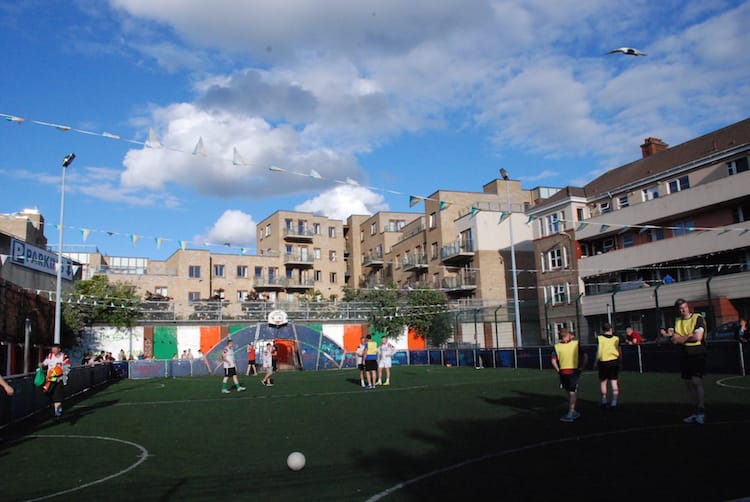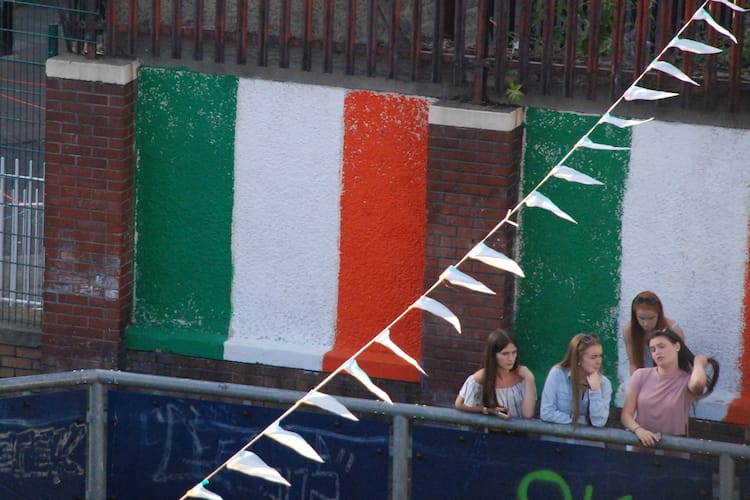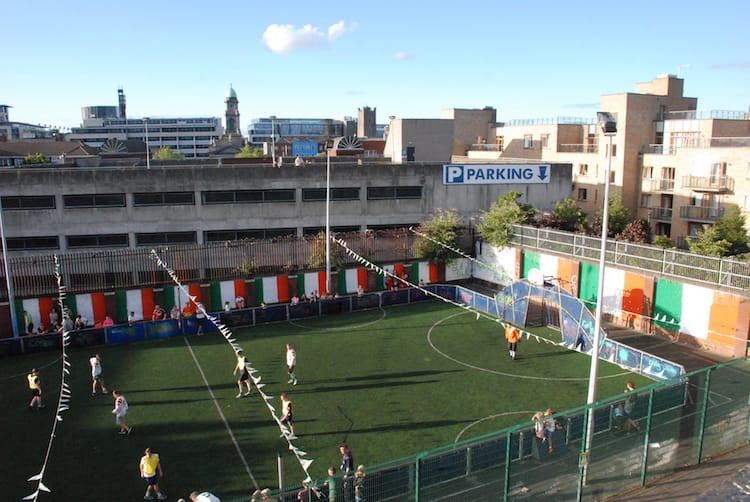What’s the best way to tell area residents about plans for a new asylum shelter nearby?
The government should tell communities directly about plans for new asylum shelters, some activists and politicians say.
Each year, Gardai and street traders meet in the Liberties for an annual football match. “It’s a great rivalry,” says Joe Cullen.

They line the edge of the small astroturf pitch, and shade their eyes from the sun and the laughter bounces and echoes from wall to wall. Behind them, one of the four-storey blocks of the Oliver Bond flats; on the far side, a concrete car park.
To the side of one of the goals, the traders josh and chatter and pull on their bibs and one player looks down at the yellow fabric stretched across his chest and belly. He tugs at the seams and pulls a funny face.
“Bit tight!” he says, with a grin.
“Ringer for budgies, aren’t they?” says Joe Cullen, as the players move out onto the pitch.
Cullen has lived in the area since 1977 and has been involved since the first time the street traders and the local Garda fielded football teams against each other — an event that has now become an annual tradition as part of the Liberties Festival.

That was back in 1988, which some remember as the year Celtic Football Club won the league and cup double. It’s been held each of the 28 summers since, except once, three years ago, when there was too much going on in the area.
“It mushroomed and just kept going and going,” says Cullen.
He brushes off any questions about the guards and street traders, whether or not the relationships were fraught in the past. “It’s just sport,” he says. “It’s a great rivalry.”
Streams of bunting are stretched between fences above the pitch and flutter in the blue sky. “I be sweating, watching,” says Cullen, as he leans his elbows on the railings. Behind the goal, a guy lights up.
“Ah, there’s no smoking before you play. He’s smoking! God in heaven,” he says.
The referee appears and Garda Liam Holland, who has shin-length trousers and a boyish face, sets the ground rules.
“We’ll just tag on, tag off. Twenty-five minutes a side,” he says to the referee. “The ball is only out if it goes over that yoke. You can score from anywhere.”
The match begins.
It’s not entirely clear who has won how many times in past years, or how close the matches have been. It depends on who you ask.
“The guards usually get thrashed!” says Tony O’Rourke, who runs a nearby cafe and is stood near the corner of the pitch. “I think the guards might have won twice, or once.”
“It’s always been fairly easy going,” he says. But there aren’t as many traders around these days.
O’Rourke can remember the stalls that stretched from the hardware store Chadwicks up to Plus & Minors clothes shop, when he was growing up. “Now, they’re all gone except for the corner,” he said.

A few kicks in, the ball flies up and disappears over the wall. There’s a pause and amusement as somebody tries to find a new ball.
“Ah, there’s one. No money was spared,” says O’Rourke.
On the pitch, Karl “Happy” Bateman runs up the right wing, and taps the ball through the legs of the guards’ keeper. Cheers and clapping come from the home ground.
“Go on Greg, go on,” calls O’Rourke to another player, Gregory Hill. “You’re away.”
The teams are split, six aside. They tag on and off. Some of the traders are playing for the guards as well, because they needed a few top-up players.
“Lads were on shift, we couldn’t get fellas off,” says Holland, after the game. “It’s a great community initiative, and for a lot of the kids in the area, football is the main thing that keeps them out of trouble.”
The traders’ team pass it around, a tangled tackle knocks one player to the ground.
“Give him a Thomas Street handshake,” shouts a young boy from the sideline, the top of his head just high enough to see over the railings.
A tall player with number 10 on his back falls over. “Sit down will ya!” shouts the young boy from the sideline, with delight.
There’s another goal, and another, and another.
“I don’t know that chap in the jersey,” says one woman on the sideline.
Christine Lynch watches the ball pass between the players. She just lives around the corner, so came down to support. It’s good for the community, she says. “It does be serious though. You want to win.”
Willo McAdams, a young guy with floppy hair and quick footwork, makes a break for goal. As the players grow sweatier, the space between them seems to grow.
Sam Lyons hangs over the side of the fence next to his granddad, Kenny Lyons, in a purple-striped T-shirt. Kenny Lyons used to play.
“We were all young men then,” he said. “There was always camaraderie after, shake hands. They help the flats as well, the guards, like.”
He hasn’t counted the wins and losses, can’t remember off the top of his head. “Ah, I can’t think back,” he said. “It was always close.”
The guards used to roll in in a police van, he says. A couple of years ago they got astroturf on the pitch, it used to be just concrete.

“Come on Karl!” says Sam Lyons. “He’s wearing the exact same shoes he wore last time as well.”
“He’s not out of these flats, is he?” asks Sam, as another player takes up the ball. “Who’s he?”
“He’s just on the team,” said Kenny.
The local chemist, tall Paddy Keville, kicks the ball into the corner, and it bounces high and spins. McAdams makes a run for it for the traders, and slides the ball into the left corner of the goal.
“I know him! He scored a couple of goals last time as well. He’s a real good player,” says Sam.
“There was an awful lot of people more then, than there are now. There’d be a couple of hundred people here,” says Kenny.
On the pitch, Liam Holland kneels down and does up his laces.
“Ahhh. Ya better finish this one,” shouts Sam.
“What’s the score?” asks a girl.
“It’s 8-3,” says one.
“It’s 9-3,” says another.
On the sideline, Gayle Cullen Doyle cheers for the traders, and they discuss extra time, and egg on the team. The ball moves quickly from one end of the pitch to the other.
As the referee does three clear blows on his whistle to mark the end of extra time, there are good-natured cheers and claps from the sidelines.
Holland bounds towards the edge of the pitch and wipes the sweat from his face.
“11-6,” he says, with confidence.
“It was 11-1,” says Cullen Doyle.
“Ah, come on now, it’s 11-6, okay?” says Holland, with a big grin.
No, it’s 11-2! It wasn’t 11-6,” says a woman with a short hair and tattoos on her arms.
“It wasn’t 11, it was 13,” another mischievous voice says from the crowd.
The air is cooler now and the sun drops behind the clouds. Next to Holland, Gregory Hill — “born and bred in the flats”, he has said — is stood with a grin on his face.
“Man of the match! Man on the match,” he insists.
“Just say: man of the match,” says the woman with tattoos. “Didn’t even need his inhaler once!”